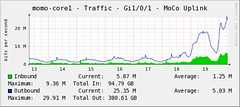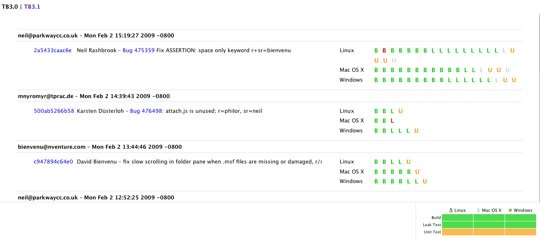A long time ago, when the Mozilla Try Server was almost brand new, we took it, applied a generous amount of duct tape to it, and called it the Thunderbird Try Server.
It worked, but barely. Since then, the Mozilla #build folks did an amazing job adding new features to theirs, fixing bugs, and making it more awesome in general. Unfortunately, the Thunderbird Try Server stayed behind, the way it was. Bugs against it were piling up, especially from folks using both try servers and noticing all the missing features compared to the Mozilla Try Server.
All this is about to change! The Mozilla Messaging Build team has worked on recreating a try server with all the new features (and codebase) that runs the Mozilla Try Server.
On Thursday, we'll be switching over to the new try server. What does this mean?
- push to try (try-comm-central)
- e-mail notification of build completion
- try builds for any comm-* branch
- packaged mozmill tests
- double the builders
- and much more...
By just doing:
$> hg push -f ssh://hg.mozilla.org/try-comm-central/
from a comm-* checkout, you'll be able to trigger try builds. It's that easy!
For more detailled instructions, you can just refer to the Mozilla Try Server documentation, just use /try-comm-central/ where it says /try/, that's the only difference. Also check the Mozilla Messaging Try Server wiki page, for documentation specifically about our try server (not updated yet)
Right now, we will only be running regular builds and mozmill runs, as the other type of builds are all waiting on the libxul work to complete before they can be made to work easily. Also, there are various features that we want to see in our try server that will not be done, but they will be tackled one by one over the upcoming weeks.
There are 2 important thing to note. The first one is that we'll be turning off the web interface for our try server that allowed for arbitrary patches to be submitted. It was a mess of code, and would simply not work right in this new push-to-try way of doing things.
I know the Mozilla #build folks are working on a new, shinier web interface to their try server, and once they do, we'll just port it over as well.
The second thing (and I suspect many will be happy about that) is that since push-to-try works via hg.mozilla.org, there is not going to be a need for a special certificate to gain access to it. Anybody who already has hg.mozilla.org access gets automatic access to our try server!
As before, you will be able to follow the status of builds on the ThunderbirdTry tinderbox tree.
For bugs specific to our try server, you can file bugs under Mozilla Messaging > Try Server












